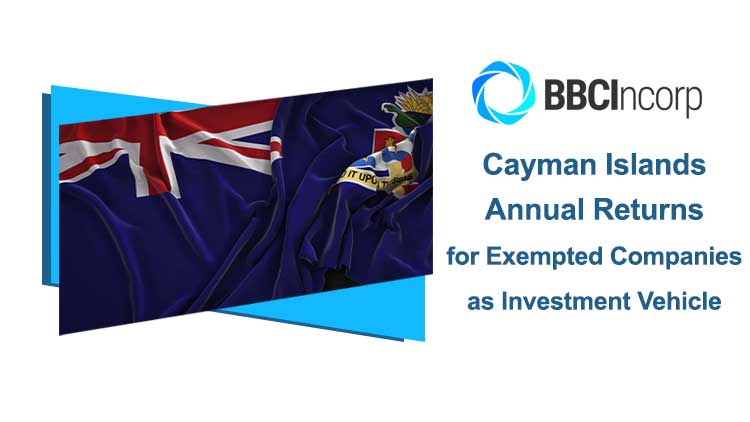
Being listed in the Global Financial Centres Index, Cayman Islands has become a leading choice of jurisdiction magnetizing investors around the world. Cayman Exempted Company places among the most common investment vehicles.
You must submit the annual returns to maintain your company’s good standing. Failing compliance will cost you a significant amount of time and money.
In this article, we will explain the requirements for Cayman Islands annual returns filing in detail.
1. Cayman exempted companies registered as investment funds

Cayman Islands has attracted thousands of regulated open-ended funds (mutual funds) and close-ended funds (private funds). Strikingly, US investors occupy the largest proportion. The reasons for this popularity are the island’s tax neutrality, its proximity to the US, tailored legislation for investment funds, and up-to-date regulatory regime.
Open-ended funds mainly choose exempted companies for the business structure. So, what might be the reasons?
Under Cayman law, an exempted company is defined as a company conducting the majority of its business activities outside the Cayman territory. The entity is ideal for entrepreneurs who are desired to engage their businesses “offshore”. For any activities carried out within the island, the company must obtain a license from relevant authorities.
By its nature, Cayman Islands exempted company is the corporate pick of vehicles for investors who want to start a fund business. An exempted company that wishes to operate as an investment fund must follow the regulations set out in Cayman Private Fund Act or Mutual Fund Act besides the Companies Act.
…and more great things why exempted companies should be opted for investment business:
Substantial degree of flexibility
The regulated entity requires only one shareholder and no minimum capital. Moreover, the exempted company’s shares are redeemable and re-purchasable, which is a good fit for mutual funds.
Investor limited liability
The Cayman exempted company has a separate legal personality. The company acts as a natural person with the legal separation between itself and the owners. This means that you are free from the company’s debts and obligations.

Registration of an investment fund under exempted company
The Cayman Islands Monetary Authority (CIMA) regulates the registration and regulatory compliances of Cayman exempted companies under investment purposes. The law is based upon English common law. All legislations were revised in 2021.
The registration procedures are similar for an open-ended fund and a close-ended fund registered under an exempted company. Below are the key requirements:
- Articles of Association of the registered exempted company;
- Constitutional document (The Memorandum of Association);
- Application form;
- Chart of the fund structure;
- An offering document or summary of terms of marketing materials, if any;
- A consent letter to confirm the approval of the administrator and auditor of the fund, if any.
To maintain the registration of the investment vehicle, you must ensure your company complies with the requirements defined by Cayman law. The submission of Cayman annual returns is one of the most-concerned matters. Let’s move on to the details in the next section.
2. How to file Cayman Islands annual returns for exempted companies operating in investment funds
All exempted companies that are registered as either Cayman mutual fund or Cayman private fund must file the annual returns to CIMA. The fund operator will be responsible for the compliance management.
Moreover, the fund must make the appointment of licensed or registered functionaries for certain procedures.

2.1. Key functionaries appointment
Before entering into the detailed process of the filing, you should understand and appoint the key functionaries. These functionaries will take a crucial part in the compliance procedures of your company. Their roles and responsibilities must be clearly defined. And they must act in accordance with the constitutional and offering documents of the fund.
Below is a list of the functionaries your company shall appoint for the annual return filing:
An administrator. It is not a mandatory appointment for all types of funds except for mutual funds. CIMA will require a consent letter from the administrator to confirm the appointed responsibilities.
An investment manager. The regulated fund shall appoint an investment manager or advisor to manage or counsel the investment decision.
Directors. The company is required to have at least two directors. They can be natural persons or business entities. All debts and obligations of the company are not liable to the directors.
Custodian. The appointment of the custodian is to manage assets such as cash and securities of the company. The custodian must act in pursuance of the custodian agreement.
Auditor. CIMA will only accept the approved auditors to verify the audited accounts. The appointment is obligatory for both private and mutual funds.
Lawyer. The appointed lawyer will participate in the preparation of offering documents and the registration of the company. It is an optional but advisable appointment.
2.2. Process of annual return filing
The annual returns require you to file annual returns as an exempted company and as an investment fund.

As a Cayman exempted company
In January each year, you must submit an annual return and annual fee to the Cayman Registrar. The obligation is applied on exempted companies that don’t hold a license to conduct business within the Cayman Islands. The filing must state the confirmation that the company fully complies with the Cayman Companies Act.
The failure of submission will result in a penalty.
As an investment fund
All Cayman funds are required to file the Fund Annual Return (FAR) alongside the financial statements within six months after the fiscal year-end. For the return filing, you must submit the following documents on the Regulatory Enhanced Electronic Forms Submission (REEFS) portal:
- FAR form including information associated with regulated funds;
- Audited financial statements;
- The Operator Declaration must be signed by the operator of the investment fund to confirm the fund’s compliance with other regulatory obligations.
2.3. Explanations for other regulatory obligations

Annual registration fee. To maintain the operation of the fund, you must pay the registration fee by 15th January every year.
Annual audit. Cayman Islands requires all accounts of the regulated fund to be audited by the approved auditor. You must submit the audited accounts to CIMA within 6 months after the financial year-end or within allowed due date extension.
The accounts must comply with principles in accordance with International Financial Reporting Standards (IFRS). They can also follow the general accounting principles of the United States of America, Japan, Switzerland or a non-high risk jurisdiction.
Retention of records. All Cayman investment funds must keep the records to be accessed at any time if requested.
Valuation of assets. You must have and maintain appropriate and consistent procedures to properly evaluate the assets. The valuation must be carried out on at least an annual basis. The valuation of the fund’s assets must be performed by:
- An independent third party who is qualified in a non-high-risk jurisdiction; or
- The fund’s manager or operator or a person who has a control relationship with appropriate provisions with the Act;
- The appointed fund administrator.
In case the valuation is not performed by such an independent third party, CIMA will require the fund to have its valuations verified by an auditor or independent third party.
Safekeeping of fund assets. The appointed custodian shall keep the fund assets. The assets can also be held by an administrator, an independent third party, the manager, or the operator of the fund. Similar to the asset valuation, CIMA may require the fund to have its title verification verified by a qualified independent third party if there is no such custodian.
Cash monitoring. The Cayman Islands requires an administrator, custodian, the manager or operator to take care of cash monitoring. Moreover, another independent third party can also take the responsibility. Such person will perform the following functions:
- Monitor the cash flows;
- Ensure cash to be booked in appropriate cash accounts;
- Ensure the receipt of all payments made by investors to the funds in case of a private fund.
In case the monitoring is not performed by such aforementioned person, CIMA may require the case monitoring to be verified by the qualified independent third party.
Identification of securities. It is mandatory for an investment fund to record the identification codes of the securities it trades and holds. The record must be accessible to the authority upon request.

Registered office. Cayman Islands requires all exempted companies to have and maintain a registered office within the border. You must give a notice of the office to the Registrar of Companies.
Anti-Money Laundering (AML). Your company must comply with the Anti-Money Laundering regime. The fund must appoint a responsible officer and report suspicions of money laundering to the Cayman authorities.
The Foreign Account Tax Compliance Act (FATCA) and Common Reporting Standard (CRS). An investment fund is identified as a financial institution. Thus, it must report the tax compliance under FATCA and CRS, if applicable.
Marketing materials or offering document filing. CIMA will require a fund to file the marketing materials or an offering document calling for the investors’ subscription. The filing must contain certain information defined under CIMA’s Rule.
Economic Substance Requirements. Cayman exempted companies are required to prove the substance of their profits. This is considered as the companies’ commitment with the European Union as a cooperative jurisdiction for tax purposes.
note
- Penalty for non-compliance. Any failure to comply with the requirements will be subject to heavy monetary penalties of up to hundred-thousands of US dollars.
- Extension. The Cayman Islands government will allow the extension in some specific situations. You must provide CIMA with appropriate explanations.
- Notice of changes. Any changes to the regulated companies such as the change of company information, fund details or change of any functionaries must be notified to CIMA.
3. Conclusion
To assure your business smoothly, you should keep track of the requirements and deadlines of the Cayman Islands annual return filing and relevant compliance procedures. In this article, we explain the filing process for general circumstance. The whole process still depends on your specific case. We recommend you to engage in professional advice. As an experienced service provider, BBCIncorp will relieve the worries and support you form your Cayman Islands company with ease.
Disclaimer
While BBCIncorp strives to make the information on this website as timely and accurate as possible, the information itself is for reference purposes only. BBCIncorp would like to inform readers that we make no representation or warranty, express or implied. Feel free to contact BCCIncorp’s customer services for advice on specific cases.
Get helpful tips and info from our newsletter!
Stay in the know and be empowered with our strategic how-tos, resources, and guidelines.

